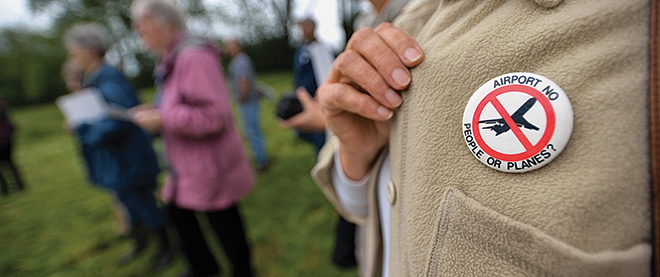Turbulence ahead at Pickering Airport proposal
How a rising Tory star seems at odds with his finance minister over an airport that might never be built
Rick Madonik / Toronto Star / Getty Images
Share

Chris Alexander is lucky for his long service as a diplomat. The immigration minister, newly promoted to the hefty cabinet post, represents a riding just east of Toronto. It’s in that backyard, far from Ottawa’s halls of power, that Alexander requires all of the diplomatic prowess he earned during his 18 years in the foreign service. He’s in the middle of a fight between the Harper government’s most senior minister, tenacious protesters with a proven track record, and a political opponent who could threaten Alexander’s re-election in a couple of years.
The heart of the battle is an airport that might never be built. In 1972, the federal government expropriated 18,600 acres of land in rural Pickering, Uxbridge and Markham, ostensibly to make way for a new international airport. Residents were furious. They argued that prime farmland was more important than an airport they said no one wanted. Three years of sustained pressure forced the provincial government, then headed by Bill Davis, to refuse to build infrastructure to support the airport. Pierre Trudeau’s Liberals, left hanging, cancelled the lofty plans. But the feds retained ownership of the lands, and after decades of quietly sitting on the project, Finance Minister Jim Flaherty stood at a podium in the region this past June and gave it new life.
Residents were once again furious. Some have paid rent to Transport Canada since the fight’s earliest days, and they’ve vowed to fight the airport to their deathbed. They’re counting on Alexander, who campaigned against the airport during the last election, to stand up for them in Ottawa.
Alexander has massaged his position over the last two years. In 2011, he told the Toronto Star in an email he “absolutely opposed” an airport, and pledged to “work with area residents and communities to determine how best to move toward resolution of this issue.” He affirmed that opposition at an all-candidates debate in nearby Claremont, Ont. Now, he no longer explicitly opposes the government’s plans—and is vague about what exactly he favours. “I support our government’s determination, first announced in summer 2011, to resolve this long-standing issue,” he said in a statement to Maclean’s. “I pledged myself to ending these four decades of neglect, and to returning these lands to full use.” But Alexander won’t say what he wants to see on the Pickering lands, aside from emphasizing they “should serve the long-term economic and environmental needs of our community, Durham Region and the entire GTA.” Nor did he address a question about whether or not his position had evolved. He applauded the government for ending all the uncertainty, even though there’s still no timeline for the airport’s construction or what will happen with leftover land.
But if Alexander is no longer outright opposed, residents still maintain he’s on their side. “Right up until the last time we talked to him, he was adamant that he opposed an airport,” said Pat Valentine of the protest group Land Over Landings. “We have never heard him say otherwise.”
Alexander’s non-commitment stands in stark contrast to Flaherty’s advocacy. At the June announcement, the finance minister was buoyant about his government’s support for a new airport. “I’m here to confirm that the uncertainty ends today,” he said. “It’s 41 years later. The GTA has grown. Pickering has grown. The demand is here.”
Flaherty, Alexander, then-environment minister Peter Kent and Ontario Transportation Minister Glen Murray all attended the June announcement. Sources tell Maclean’s the four men might have appeared all smiles, but that Alexander was blindsided by the government’s airport announcement—and under the impression Flaherty would only be announcing the transfer of 5,000 acres of airport land to the neighbouring Rouge Urban National park. Murray publicly accused Flaherty’s office of announcing the airport plans without keeping the province in the loop. Flaherty denied the allegation.
Through it all, Alexander faces a potential rematch with the Liberal opponent he beat in 2011. Mark Holland, now with the Heart and Stroke Foundation, won’t talk about his plans for the 2015 election. But he doesn’t mince words. “My then opponent, now MP, made a commitment that he would fight [the airport] with everything he had,” he said. “It was a very significant issue in the last campaign, and I suspect it will be again.”
Alexander’s riding, Ajax-Pickering, will be sliced in half when he runs for re-election. Ajax, which comprises the southeastern portion of the current riding and none of the airport lands, will be hived off. Those lands will be captured almost entirely by a new riding, Pickering-Uxbridge. Wherever Alexander chooses to run, Holland could follow, and the former star candidate would be forced to choose sides. If he stays neutral, he risks losing the trust of the airport’s opponents. If he opposes the project, he defies his own government. The rookie MP is going to need all his diplomatic skills.